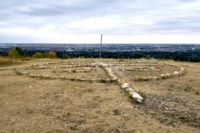LC engineering technology program overcomes COVID-19 challenges
By Greg Bobinec on December 18, 2020.
 Lethbridge College photo
Students take part in civil engineering technology at Lethbridge College.
Lethbridge College photo
Students take part in civil engineering technology at Lethbridge College.LETHBRIDGE HERALDgbobinec@lethbridgeherald.com
Although the current pandemic has presented challenges on education quality, Lethbridge College, among other engineering technology programs, are being recognized for their trademark ingenuity and inventiveness in finding solutions to keeping their students on track to completing their education and advancing onto their careers.
Engineering technology education is, in most cases, three years of instruction compressed into an intense two-year program at any of the four technology institutes and colleges in Alberta: Lethbridge College, Red Deer College, NAIT and SAIT. Of the Association of Science and Engineering Technology Professionals of Alberta’s (ASET) 16,000 members, hundreds are full-time students.
“It’s no surprise to ASET that Alberta Technology institutes and colleges like Lethbridge College have applied the innovation that is the hallmark of the engineering technology profession to finding safe and effective ways to continue that education for students in the midst of the COVID-19 crisis,” says Barry Cavanaugh, ASET CEO.
Lethbridge College was already ahead of the curve for the COVID-19 pandemic, as a mandatory laptop requirement for all students was already in place for all three engineering technology programs. Students had to purchase from the college laptops equipped with the latest software needed for their courses, making the transition to online instruction much easier.
Edith Olson, chair for the school of engineering technologies at Lethbridge College, says that instructors have been highly creative, setting up video cameras in classrooms, using tablets as white boards, and incorporating videos made in-house and acquired from YouTube as part of their learning experience. Students are able to connect with their instructors both inside and outside of class time via face-to-face discussions on Zoom, while they also have live interaction during class.
“The goal has been to create an as-real-as-possible classroom experience for students without them actually gathering in the classroom,” says Olson.
Cameras were installed in classrooms to allow filming close-ups, various angles and details of equipment in labs so students can clearly see the technical resources necessary for different engineering technology applications. In the new year, and in accordance with COVID-19 protocols, the college will offer some classes with the requisite facemasks and social distancing, but most theory and lab classes will continue online.
While instructors and teachers all over continue to work on and improve the way education is presented during the COVID-19 pandemic, ASET is confident in the quality of education coming from the provincial institutions and colleges providing engineering technology programs.
Follow @GBobinecHerald on Twitter
4-3




